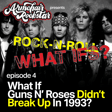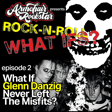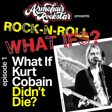
What if Rick Rubin Never Gave Red Hot Chili Peppers a Second Chance?
🎸🌹 Welcome to Episode 4 of "Rock n Roll What Ifs" by Armchair Rockstar! In today's journey, we explore an alternate universe where Guns N' Roses never broke up. Imagine a world where the iconic lineup of Axl, Slash, Duff, Izzy, and Steven stayed together, forging an unbroken path in rock history.
🤘 What new heights could they have reached?
🎤 How would their continued presence have reshaped the music industry?
🎵 And what legendary albums might we have seen?
Join us as we dive deep into this fascinating "What If" scenario, featuring expert interviews, unheard demos, and fan theories that will blow your mind! Uncover the possibilities, the music that could've been, and the impact on rock n roll.
💬 Share your thoughts in the comments! What do you think Guns N' Roses would have achieved? Don't forget to like, subscribe, and hit the bell for more rockin' episodes!
🔔 Subscribe: https://www.youtube.com/c/ArmchairRockstar
📺 Watch Previous Episodes: https://www.youtube.com/playlist?list=PL9xY_Af4b5zc4Z_f0DEipE4Lu6e38Byg0


